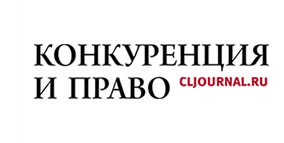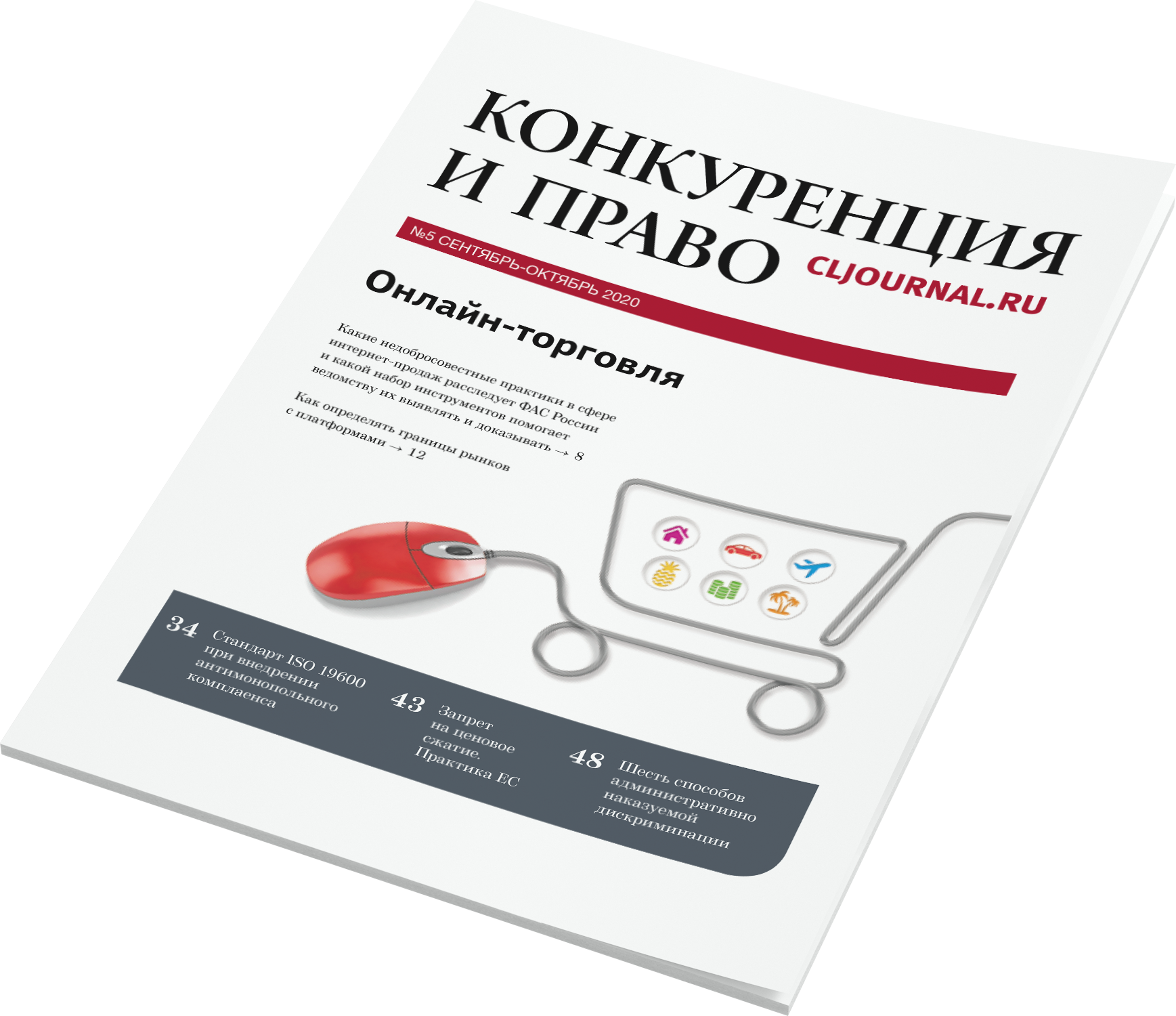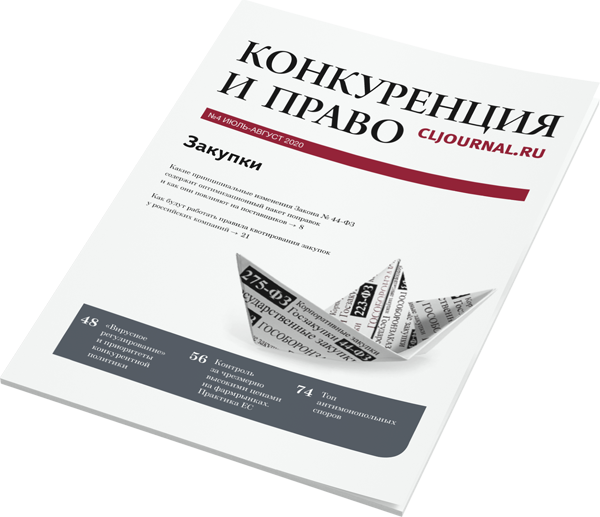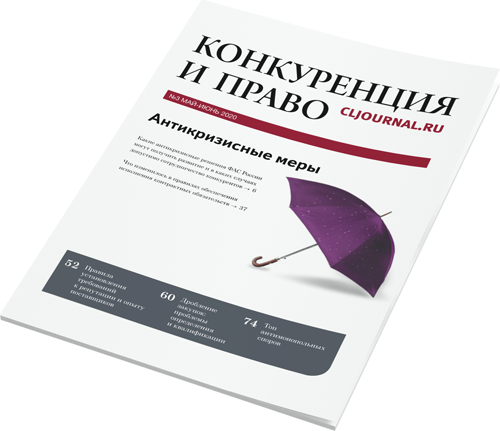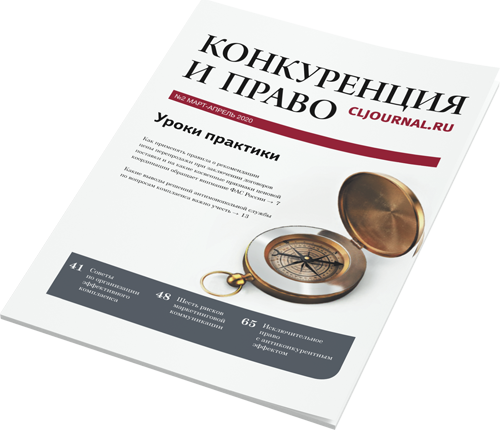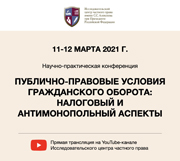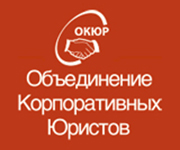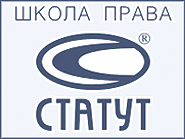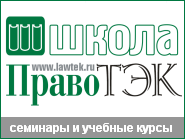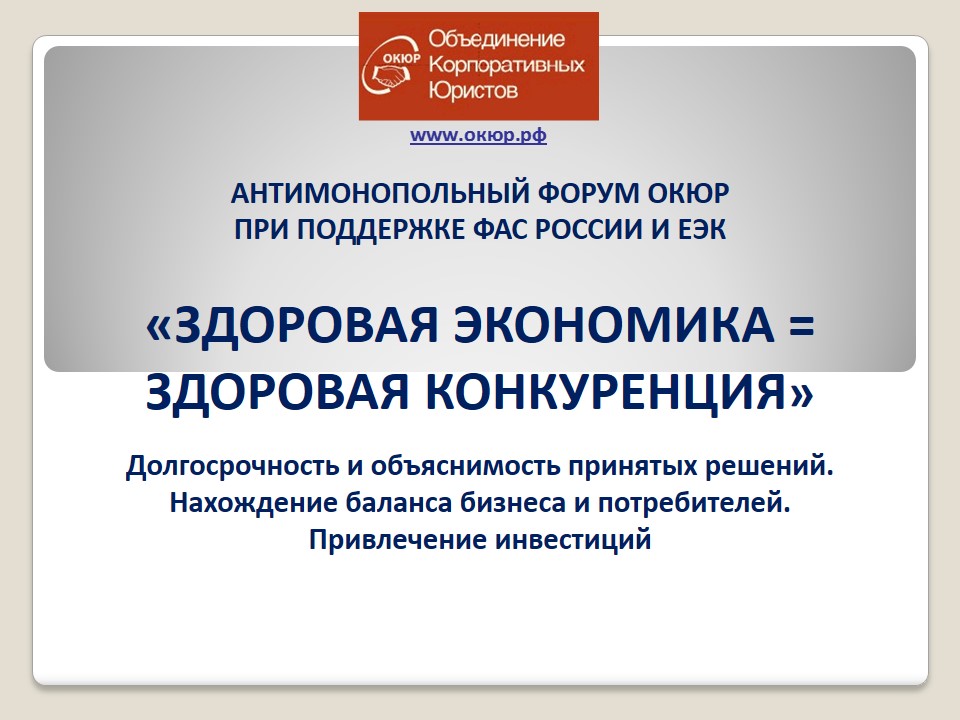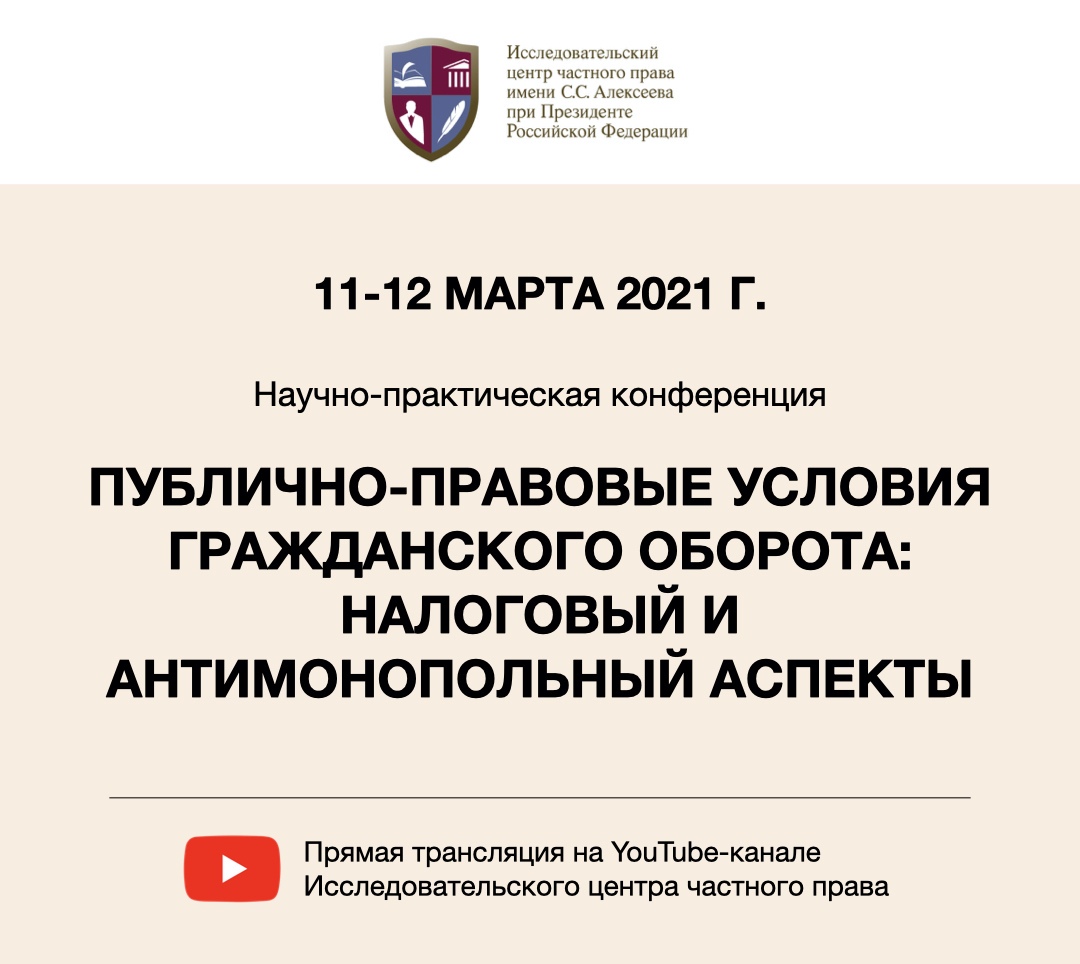|
||||||
 Pepeliaev Group advises that 19 April 2016 will see the adoption, under the auspices of the Association of European Business’s Healthcare and Pharmaceuticals Committee, of a Code for Good-faith Practices in the Pharmaceutical Sector.
Given that Russian legislation lacks direct regulation of specific topical aspects of the relationship between producers and various categories of buyers of medicines, a Code of Good-faith Practices in the Pharmaceutical Sector (the “Code”) has been drawn up. Its purpose is to arrange for the effective self-regulation of the pharmaceutical business in Russia, creating open and good-faith rules for competitive interaction in the sector. In practice, the Code brings together the rules for permissible conduct on the part of the producers and/or official importers of medicines in relation to buyers (distributors, state purchasers and pharmacies). Its effect extends to players on the markets of medicines. Exceptions are producers of pharmaceutical substances as well as of medical devices. It is assumed that the Code will, primarily, be applied to market players who have the status of a dominant economic entity. The possibility is not excluded of also having companies join up with the Code when they do not have such status, but voluntarily intend to assume additional obligations in terms of the rules of permissible conduct they observe. Undoubtedly, the signing of the Code will be a major breakthrough in the antitrust regulation of the pharmaceutical sector. However, a detailed analysis of the document shows that, in practice, contentious situations will continue to arise, requiring the regulatory regime to subsequently be clarified. We present for your attention an analysis of the main provisions of the Code. Main provisions Parties signing up to the Code
The following parties may sign up to the Code:
Participants join up to the Code by signing a declaration that they have done so. Based on such declaration, the party to the Code assumes an obligation, over a specified period of time, to implement the provisions of the Code in its operations. The declaration is placed on the party’s website so that it may be accessed freely. In turn, the Association of European Business places on its website information about the new party that has signed up to the Code. At the same time as this, the information is sent to the Russian Federal Antimonopoly Service (the “FAS”) to then be posted on the regulator’s website. Commercial policy of a party that has signed up
Under the Code, each party that signs up to it must independently draw up a commercial policy regulating the procedure for it to work with buyers. This policy should include the provisions stipulated by the Code (criteria for selecting counterparties, the procedure and timeframes for taking a decision to enter into a contract, the procedure and mechanism for granting discounts, and so on). On the whole, in relation to this issue, the Code enacts approaches that have already been developed in the practice of the FAS and the courts, in particular in terms of dominant business entities having to draw up policies for dealing with their buyers. Such policies help to minimise the risks of infringements of antitrust legislation that, in general, take the form of abuse of a dominant position. The provision of the Code to the effect that parties signed up to it should ensure non-discriminatory access to their goods by way of informing their buyers, in whatever form, of the commercial terms and conditions and changes to them also fully reflects the FAS’s approaches. Criteria for selecting distributors
The Code provides for general criteria of legal capacity, financial solvency and business reputation which a party signed up to the Code may take account of when it takes a decision on whether to enter into contracts with potential buyers. The Code attempts to settle the long-vexed issue of how anti-corruption and antimonopoly legislation relate to one another. It is established that, for the purposes of assessing a potential counterparty in terms of whether it meets the distributor selection criteria, a party may take account not only provisions of Russian anti-corruption legislation, but also international and foreign legislation, including the FCPA1 and the UKBA2. Whether there are, or are not, facts established by documents proving that a buyer violated the laws in question is regarded by the Code as a well-grounded criterion for selecting distributors. It is unclear how “facts established by documents” is to be understood, and this may cause particular issues in practice. It is supposed that, for example, decisions of various state authorities and courts will be regarded as such facts. It is likely that parties obtaining information themselves from unofficial sources (for instance, the mass media, the internet and so on) will not be a sufficient ground for refusing to work with a potential distributor. However, the fact that the FAS has agreed that the requirements of Russian and foreign anti-corruption legislation are not identical can be regarded as significant progress with regard to the relationship between the regulator and pharmaceutical companies. Therefore, foreign pharmaceutical companies have to apply the requirements of FCPA and UKBA to Russian distributors. Especially noteworthy as a criterion for selecting distributors is the absence over the previous three years of facts established by a court decision of the buyer participating in cartels containing indicators of criminal offences. It is supposed that such indicators will be causing major harm or deriving revenue in a large amount when entering into the cartel, in other words, the indicators stipulated by article 178 of the Russian Criminal Code. What is more, it follows from a literal interpretation of the Code that a guilty verdict of a court in a criminal case is not mandatory. It is sufficient for there to be a decision of any court that has come into force, including of a commercial court. Commercial terms and terms for supply to distributors
Limiting the number of distributors
The Code provides that it is possible for pharmaceutical companies independently to take a decision to supply products using a limited number of distributors. These companies must meet the requirements of the party that has signed up to the Code, which is based on the features of its business model, and on an economic and technical justification, using a transparent procedure for selection. The selection will be made on a competitive basis. It seems that parties signing up to the Code may justify such a restriction in economic terms: If there is a large pool of distributors, this entails high costs and additional staff, which is required to handle dealings with such distributors. For many companies, this is not economically prudent. Different terms and conditions
The Code provides that it is possible to set different commercial terms and conditions in contracts with buyers depending on criteria such as the sales channel (public or commercial procurement), purchase volumes, the form of payment, whether the useful life of the products is expiring, the experience of dealing with a specific distributor and other economically justified reasons. Minimum purchase volume
Based on economic and technical possibilities, a party that is signed up to the Code may set in a commercial policy a minimum volume for a one-off shipment and a minimum volume of purchases over a set period, both in terms of quantity and in terms of a monetary amount. If the buyer does not meet these conditions, the party who has signed up to the Code may terminate the contract with such buyer and may opt not to enter into a contract with such buyer for the next period. Credit limits
The Code contains criteria for setting credit limits for distributors. Such limits may be stipulated in internal documents of the party to the Code and are calculated based on objective criteria set out in the Code. If the credit limit is exceeded, the party that is signed up to the Code is entitled to suspend supplies of products to the distributor. Exclusive agreements
As a general rule, the Code does not permit a party signed up to it to enter into exclusive agreements with a counterparty to supply a product on the market of which the supplier holds a dominant position. An exception is where the purpose of the exclusive agreement is to localise production of the party in Russia, in which case that party may enter into, among other things:
Such exceptions are justified owing to localisation projects requiring large investments from both foreign and Russian partners. In order to guarantee to the Russian partner that its investments will be recouped, it is necessary to secure for such Russian partner the opportunity, after launching production, to determine the policy for selling the relevant medicines and to vest in it the exclusive right to sell such medicines in Russia. The fact that exclusivity is permissible also allows the foreign partner’s interests to be met, since it must spend much time, effort and money to bring the Russian partner’s production standards up to international GMP standards. Discounts and bonuses
The Code establishes that a party has the right to enact in its commercial policy non-discriminatory grounds for bonuses and discounts to be granted. This is based, in particular, on such criteria as reaching a set purchase volume, either expressed as a quantity or a monetary amount, or entry into a contract with a state customer. However, the Code makes no mention of many ways for granting discounts (bonuses, premiums) that are widely used by pharmaceutical companies but which have not been assessed by court and administrative decisions – for example, bonuses for an increase in sales to specific buyers or in a particular region, seasonal discounts and so on. Commercial terms and terms for supply to state customers
Under the Code, a party that is signed up is entitled to decide to take part in a procurement procedure to supply its own products directly and in such a case to refuse to enter into a contract with and to supply a distributor. In doing so, it is not entitled to refuse to supply a distributor that is expressing a wish to take part in such procedure provided that the obligation to supply the products to the distributor arose before the supplier decided to take part in the procurement procedure directly. Such approach takes into account the position of the Russian Supreme Court set out in the Resolution on the case4 of Teva Pharmaceutical Industries Limited. The court held that there was no justification for a producer to refuse to supply goods to a distributor further to a decision to take part in a procurement procedure directly, including because the producer and the distributor had concluded a contract and the producer had an obligation to supply the goods to the distributor but had not performed such obligation. Grounds for refusing to work with or to suspend working with a distributor
The Code provides that a party who has signed up is entitled to stop working with (or refuse to work with) distributors and pharmacies, including when they do not meet the criteria of legal capacity, financial solvency and business reputation. Parties signed up to the Code may also establish, in their commercial policies, other grounds to stop working with or to refuse to work with counterparties. Analysis of the practice of applying the Code
To analyse and monitor practice of applying the Code, the AEB’s Healthcare and Pharmaceuticals Committee has set up a special working group that functions on a regular basis and is made up of representatives from signatories to the Code and from the FAS. The working group analyses the provisions of the Code with reference to the issues arising when it is applied, and then forms recommendations for the AEB’s Healthcare and Pharmaceuticals Committee. It is presumed that the Committee will release a summary of practice taking account of such recommendations and will also take the initiative in terms of amending the Code in line with the business needs of the parties who have signed up to it as well as with changes to Russian and/or international legislation. Provision is made for a mandatory procedure for informing the FAS that the Code has been amended. Examining disputes between signatories to the Code
The Code vests the AEB’s Healthcare and Pharmaceuticals Committee with the powers to examine disputes between parties that have signed up to the Code when such disputes are submitted for the Committee to consider. The Committee may draw up recommendations further to its consideration of the dispute. Parties that have signed up to the Code must use maximum efforts to independently solve disputes relating to the application of the Code by way of conducting negotiations before they apply to the FAS or to the court. By agreement, parties that have signed up to the Code may refer a dispute that has arisen in the context of applying the Code to be considered by the AEB Arbitration Court. What to think about and what to do Further to the adoption of the Code, we recommend that pharmaceutical companies do as follows:
1 FCPA refers to the Foreign Corrupt Practices Act, a US federal law concerning the fight against corruption in international operations. It has extra-territorial effect. 2 UKBA refers to the Bribery Act 2010, a United Kingdom Act of Parliament concerning the battle against corruption, which also has extra-territorial effect. 3 Federal Law No. 135-FZ “On protecting competition” dated 26.07.2006. 4 Resolution No. 305-KG15-7123 of the Russian Supreme Court dated 9 November 2015 on case No. А40-42997/2014. 19 апреля 2016 г.
|
|

